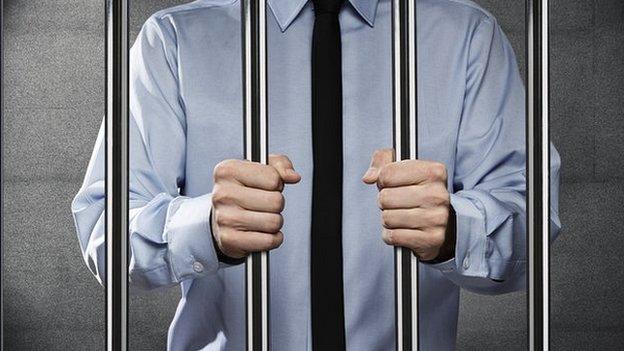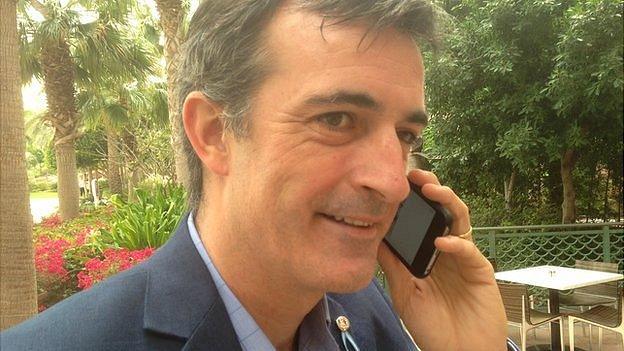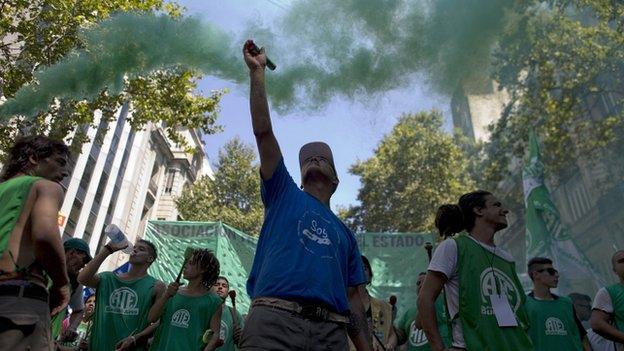Attacks on teachers '25% extra penalty' in Argentina
- Published

The changes to the penal code are intended to raise the status of teaching
An attack on a teacher would be punished with higher penalties than an attack on any other citizen under proposals in Argentina to raise the status of teaching.
It is believed to be the first time teachers would have been given a special legal protection in this way.
Education minister Esteban Bullrich's plan would add a 25% higher penalty if an offence was against a teacher.
Mr Bullrich said it would make sure the public showed them more "respect".
If the law is adopted by Argentina's congress it would mean any attack against a teacher would become an aggravated offence with increased penalties.
Longer prison sentence
It would apply to parents and students and would include verbal abuse or threats as well as physical violence.

Education minister Esteban Bullrich invited teachers to call him with their complaints
An offender attacking a teacher would receive a 25% longer prison sentence or pay a 25% bigger fine than if a similar offence had been committed against anyone else.
The plan, developed by the education minister and Argentina's president, Mauricio Macri, is a way of supporting their government's "education revolution".
"We knew we needed to raise the image of teachers in our society. Slowly, but steadily, their image had fallen," Mr Bullrich told the BBC.
"There were increased cases of disrespect from parents and students and even aggression towards teachers.
"That's when the idea of distinguishing teachers in our penal code came up. If you hit or shout at a teacher, then you are doing so towards the most important member in our society.
"Without teachers we would not have ministers or presidents, we would not have the world today. Let us grant them that respect and distinguished treatment."

More stories from the BBC's Global education series, external looking at education from an international perspective and how to get in touch

Mobile minister
John Bangs of Education International, an international federation of teachers' unions, supported the signal sent by the idea of tougher penalties for assaults on teachers.
"'Schools are fundamental to their communities. If teachers are in fear, it means that children are in fear. Nothing could be more corrosive to confidence and learning.

President Macri wants to push for education reforms
"Argentina's action might appear to be a simplistic response to complex problem, but it gives a powerful message that violence against a teacher is not only an individual assault but an assault on education."
Argentina's education system, which has performed poorly in international tests, has faced waves of industrial unrest, and Mr Bullrich has campaigned to gain the support of teachers for education reform.
As minister for education in Argentina's capital, Buenos Aires, he published his personal mobile phone number so that teachers could ring him directly with their problems.
The minister said teachers thought no-one in government was listening to them and that was contributing to low morale and disaffection.

Long history of industrial disputes: Public sector workers on strike this year in Buenos Aires
Mr Bullrich gave out his mobile number for "questions, comments and complaints", in a bid to tackle teachers' practical worries such as errors with pay and allowances or problems with school buildings.
"People didn't really know if it was true that I would answer," said Mr Bullrich when he launched the scheme.
"This guy rang at 02:00 and really blasted me on the phone - 'You owe me money.' So I called him back at 02.15 and said, 'Hello this is the minister of education.' First there was silence on the line and then we got the information and we solved the problem."
The number of teachers' strikes fell sharply in Buenos Aires.
Protected status
Now Mr Bullrich is the national education minister and he has continued offering his mobile phone number - and he says that he receives hundreds of phone calls each day.
In England, teachers' unions have made repeated warnings about attacks on school staff.
The ATL teachers' union recently published a survey claiming four out of 10 teachers had experienced violence in the past year. This included being hit, kicked or having objects thrown at them.
There have been international efforts to formally give schools and teachers a protected status during wars and conflicts.
It followed concerns that places of education were being attacked, whether accidentally or deliberately, and they did not have the same protection that was accorded to hospitals or medical staff in warzones.
A Safe Schools Declaration has been signed by more than 50 countries, committing them to protect schools and their staff.